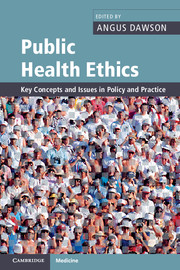Book contents
- Frontmatter
- Contents
- List of contributors
- Preface
- Acknowledgements
- Section 1 Concepts
- Section 2 Issues
- 5 Smoking, health and ethics
- 6 Infectious disease control
- 7 Population screening
- 8 Vaccination ethics
- 9 Environment, ethics and public health
- 10 Public health research ethics
- 11 Equity and population health
- 12 Health inequities
- Index
- References
8 - Vaccination ethics
Published online by Cambridge University Press: 05 July 2011
- Frontmatter
- Contents
- List of contributors
- Preface
- Acknowledgements
- Section 1 Concepts
- Section 2 Issues
- 5 Smoking, health and ethics
- 6 Infectious disease control
- 7 Population screening
- 8 Vaccination ethics
- 9 Environment, ethics and public health
- 10 Public health research ethics
- 11 Equity and population health
- 12 Health inequities
- Index
- References
Summary
Introduction
Ever since it began as an intervention designed to protect against smallpox, vaccination has been controversial. However, the passion that people bring to debates about vaccination is not always supported by a fair review of the evidence and issues. In this chapter I will outline and discuss a few of the key arguments about this important area of public health.
I begin with some clarifications about the limits of this chapter. First, vaccination at its broadest can be taken to involve some form of artificial stimulation of the immune system as a response to actual or potential bacterial or virological infection. Vaccination might be either preventive (given prior to potential infection) or therapeutic (given in response to infection). This chapter is deliberately termed ‘vaccination ethics’ as I will restrict my discussion to priming of the immune system before contact with any disease. This means we can exclude from this chapter discussion of other forms of immunization such as the giving of immunoglobulin after possible exposure to, or after infection with, a disease. This is not because such techniques are unimportant, but because both the use of immunoglobulin and therapeutic vaccination might be thought of as primarily clinical interventions rather than public health activities. This chapter will concentrate on preventive vaccination as this is the core controversial issue. Second, the classic image of vaccination consists of an injection (into the muscle or under the skin).
- Type
- Chapter
- Information
- Public Health EthicsKey Concepts and Issues in Policy and Practice, pp. 143 - 153Publisher: Cambridge University PressPrint publication year: 2011
References
- 13
- Cited by



